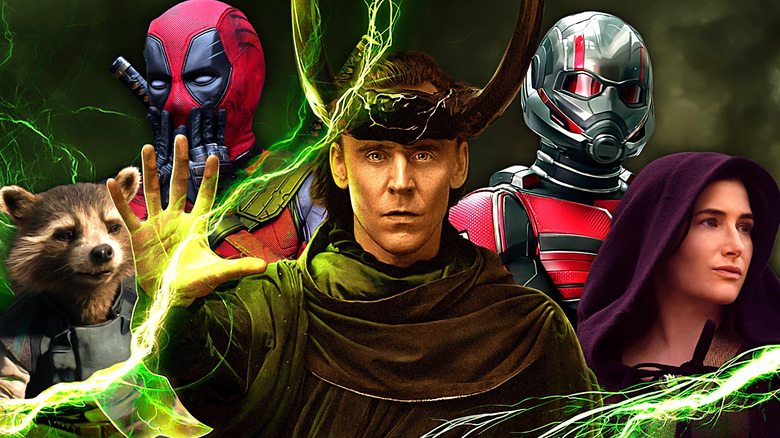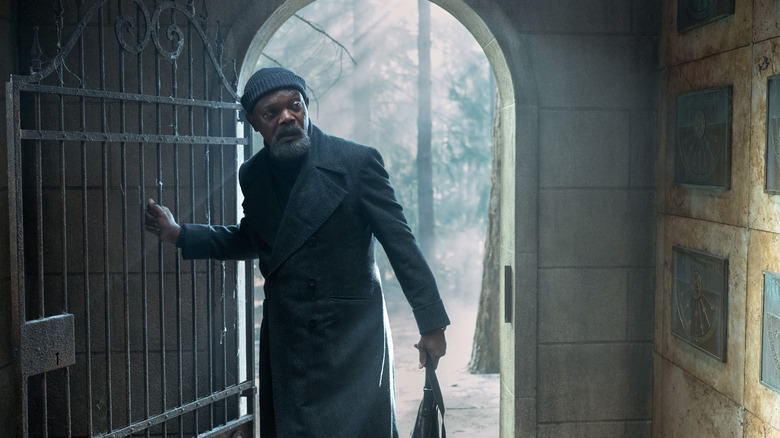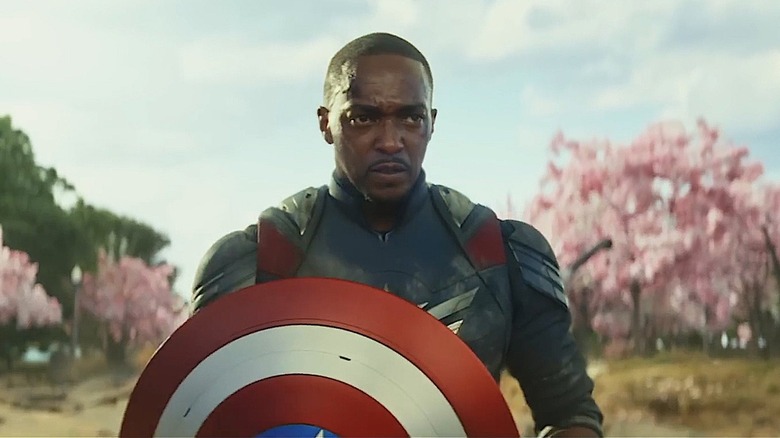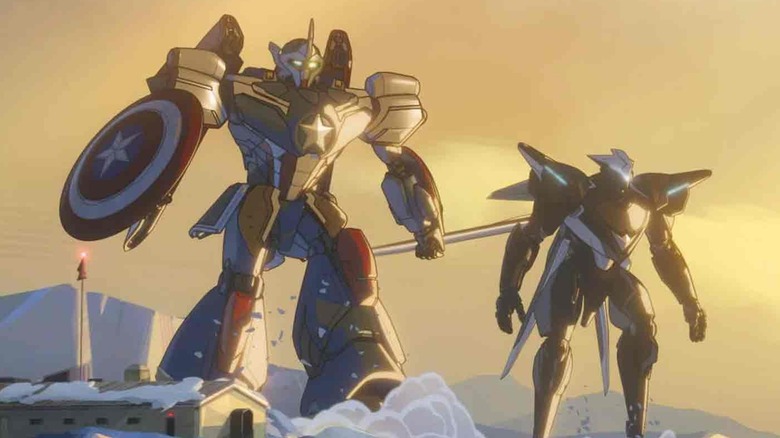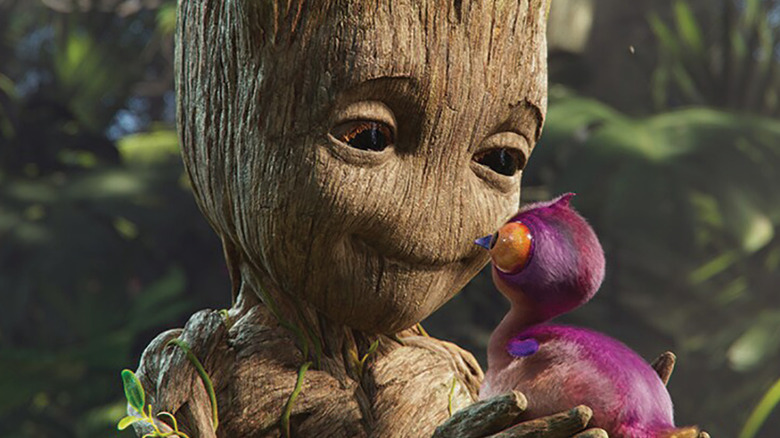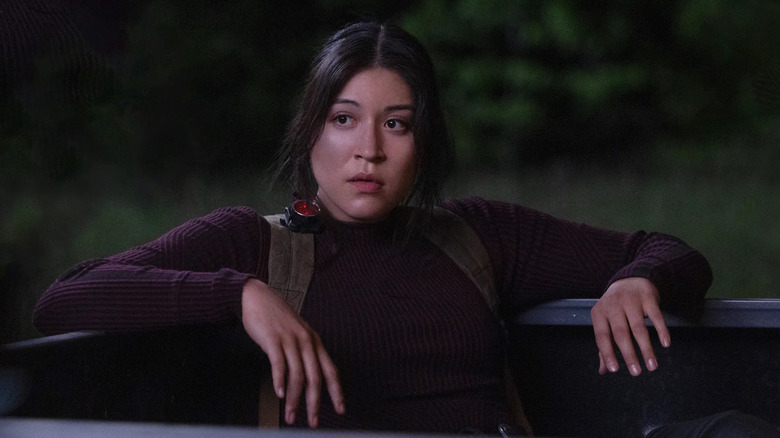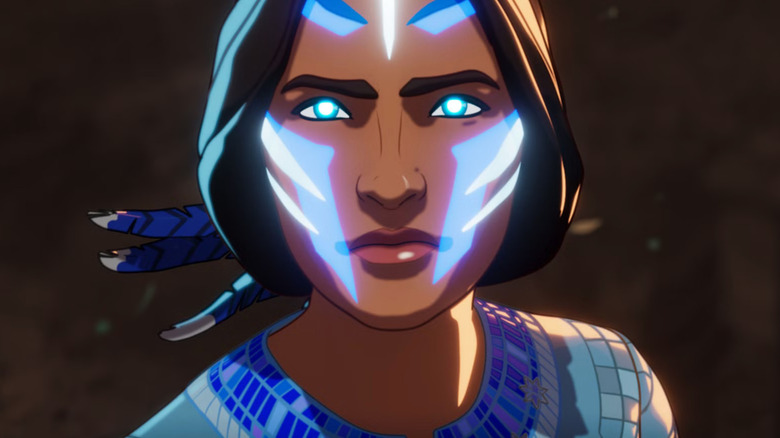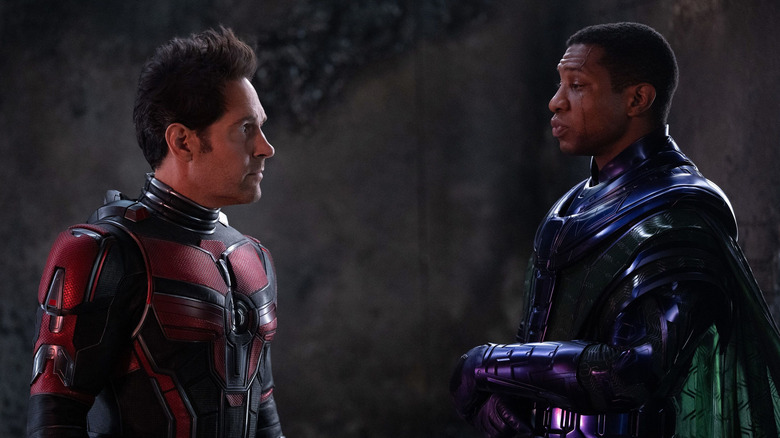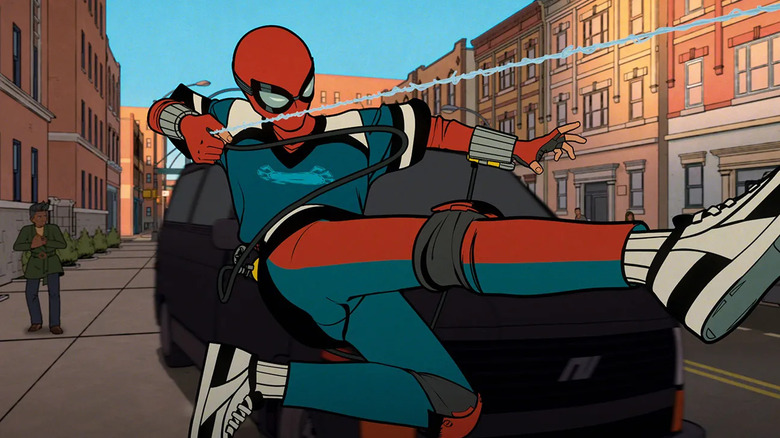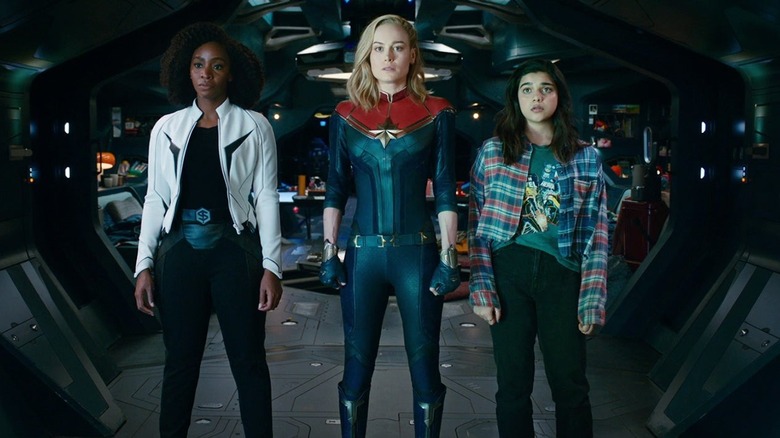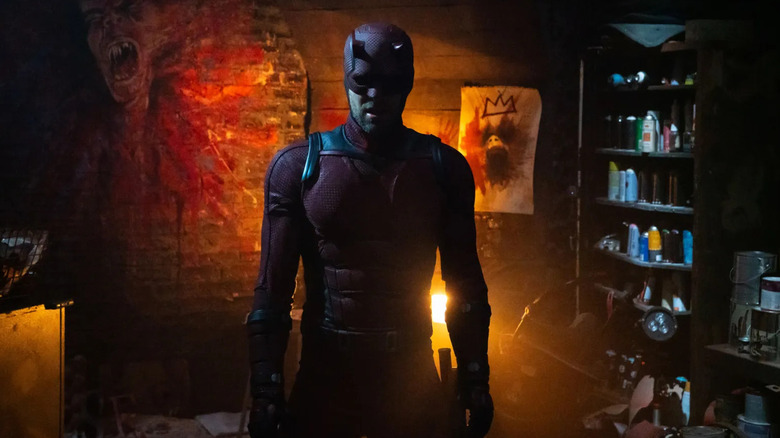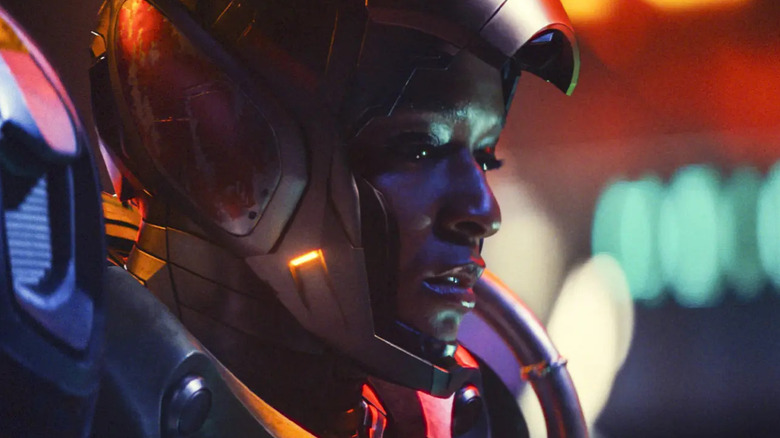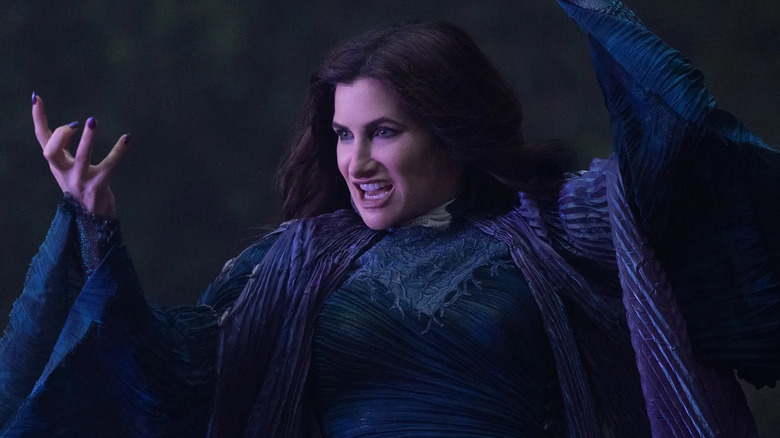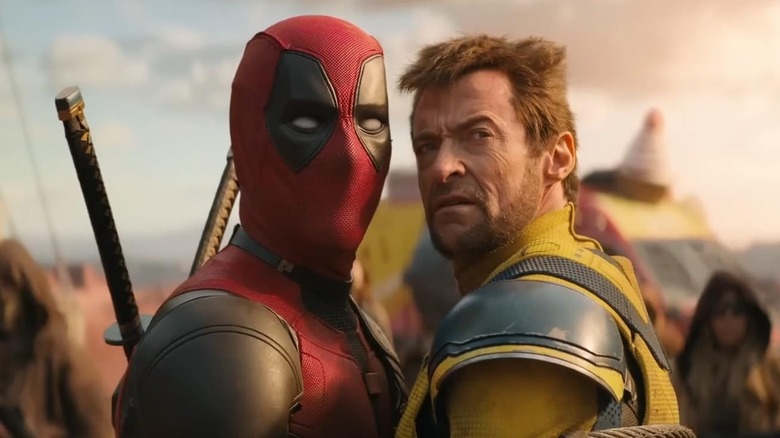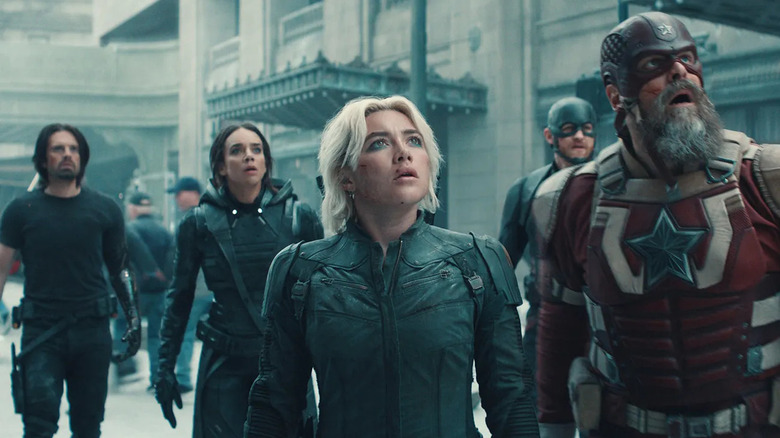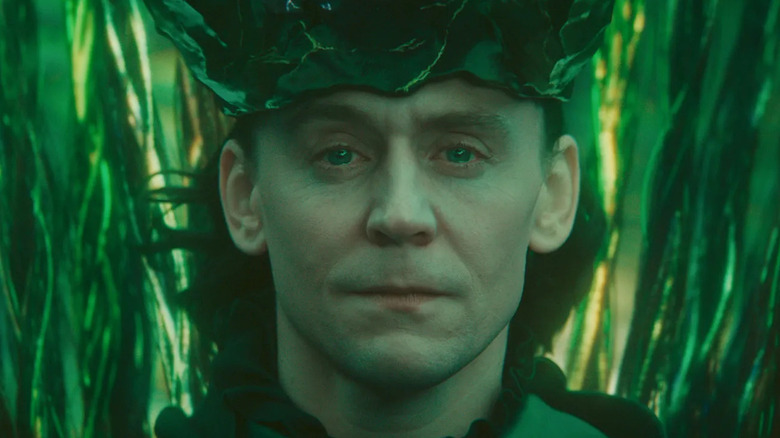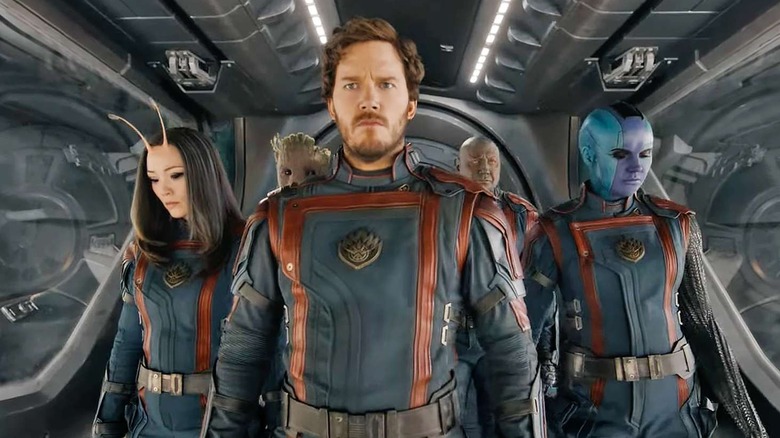Every Movie And TV Show In Marvel's Phase Five, Ranked
Nobody is rooting for Marvel Studios to emerge stronger from its post-"Endgame" slump harder than us. The studio that completely reinvented and defined the superhero movie subgenre for the contemporary age — and, for better and for worse, turned the entire filmmaking industry on its head — has had to endure an awkward transitional phase (or, rather, two awkward transitional Phases in a row) as it weathers behind-the-scenes controversies, pandemic-related scheduling issues, and corporate pressures to creatively overextend. As a result, Phase Four of the Marvel Cinematic Universe was wildly uneven. The safest bets often felt constrained by forces outside the story, while the biggest swings lacked the polish and consistency expected of the brand today.
When Phase Five kicked off in 2023 with "Ant-Man and the Wasp: Quantumania," MCU fans were actually worried for the first time that the franchise was losing its magic for good — but were things really as bad as they seemed in hindsight? Now, having concluded with "Thunderbolts" and "Ironheart," we have a better picture of what Phase Five was working toward, both in terms of narrative and correcting the creative course for the MCU overall. As we head into Phase Six with "The Fantastic Four: First Steps," a reevaluation of these projects is in order — and, when it comes to ranking things, we here at /Film are all too happy to oblige.
16. Secret Invasion
Oh, "Secret Invasion" — the TV series that bears the name of one of the most consequential Marvel Comics storylines of all time and will, ironically, probably be the least consequential project Marvel Studios has ever produced for Disney+. There's a lot that went wrong behind the scenes of "Secret Invasion," including overhauled creative teams and drastic late-production reshoots meant to significantly change the original story. It's tempting to try and find some way to give the series a pass because of this — production was so chaotic that it's kind of amazing we got anything (looking at you, "Blade").
Unfortunately, however, what fans did get was too disappointing to place anywhere but the bottom of our list. The cast, especially Samuel L. Jackson and Ben Mendelsohn, go to great lengths to try and make this confusing combination of political thriller and alien invasion story seem plausible, but the ultimate enemy of the series is the need for the franchise to avoid real change at all costs. By the time you get to its infamous final episode, you wonder why you bothered watching at all.
15. Captain America: Brave New World
After the uneven but often triumphant "The Falcon and the Winter Soldier" miniseries on Disney+, MCU fans were cautiously optimistic about Sam Wilson's (Anthony Mackie) tenure as the new Captain America. Having firmly distinguished himself from Steve Rogers (Chris Evans) and compellingly wrestled with the implications of taking up such a patriotic mantle, it was high time for fans to see him soar as a hero in his own right.
Instead, "Captain America: Brave New World" (having also suffered from extensive reshoots during post-production) is a depressingly predictable, by-the-numbers narrative rehash of "The Falcon and the Winter Soldier," as well as a tonal and stylistic rehash of "Captain America: The Winter Soldier." Not even the charm of Harrison Ford — stepping in for the late William Hurt as now-President Thaddeus Ross — can save the film, in large part because trailers, merchandise, and, eventually, the studio and actors themselves spoiled his transformation into the Red Hulk, which really serves as the film's only potentially surprising twist.
14. What If -- Season 3
It was a huge bummer when Marvel announced that "What If...?" would be ending after just three seasons. The animated anthology series had brought about some of the best and most imaginative moments from Phase Four of the MCU, freed from the constraints of continuity and allowed to go to weird, dark alternate realities that often capitalized on the unrealized potential of certain characters from the films. But perhaps it was for the best, as season 3 shows many signs that the project was losing creative steam.
There are some genuinely amazing episodes that are worth watching — "What If... The Emergence Destroyed the Earth?" makes the best use of the stable of actors Marvel was able to hire this time around, and the Red Guardian vs. Winter Soldier and 1872 episodes are perfect examples of "What If...?" wielding its power to give us stories we'll never get from the MCU proper. They still don't make up for the slog that the rest of the season can feel like, especially when you know this is the last batch of these stories we're ever going to get.
13. I Am Groot -- Season 2
Did we need a second season of Kirsten Lepore's "I Am Groot?" Eh, probably not. Are we glad we got one anyways? Yeah, pretty much.
Despite James Gunn exiting the series as executive producer to fully devote himself to running things over at competitor DC Studios (making this the first "Guardians of the Galaxy"-related project worked on without him), "I Am Groot" retains its adorable, breezy charm for five more episodes. It is about as inoffensive as a Marvel project could possibly be (and that's really saying something), taking the viewer on a tiny journey for just a few minutes at a time.
That being said, this also can't help but render it a little weightless in terms of narrative, character growth, and consequence — the three things that are arguably most vital to the MCU's survival at this moment. As cute and occasionally amusing as it is, it has a hard time making an impact.
12. Echo
The tragedy of "Echo" is that it starts off so strong and raises the bar so high for itself that, when the quality takes a bit of a dive in the latter half of the series, it's all the more disappointing. Alaqua Cox's Maya Lopez was a memorable part of the supporting cast of "Hawkeye" (a feat all the more impressive when you consider the amount of star power she was up against), and it made some sense that Marvel Studios would select her character to explore further. She was morally complex, empathetically written and performed, and was the focus of some of the series' best action sequences.
When "Echo" sends Maya into a room full of bad guys or pairs her with Vincent D'Onofrio's equally captivating Wilson Fisk, the series makes the most of the traits that made her worthy of her own show. But in between those moments, as it tries to progress an interesting but not-quite cohesive story, it feels like it's constantly grasping for meaning in narrative, theme, or character that's just out of reach.
11. What If -- Season 2
On the whole, "What If...?" season 2 doesn't achieve what the 1st season did. In its debut outing, the show was able to tell several subtly connected stories that made it, as a season of television, somehow greater than the sum of its parts. And yet, the parts of its 2nd season are still worth another watch.
Period episodes such as "What If... the Avengers Assembled in 1602?" and "What If... Peter Quill Attacked Earth's Mightiest Heroes?" (set in the '80s) imagine radically different versions of Marvel's most famous super team — and the new original character Kahori (an Indigenous superhero who gains the power of the Tesseract, voiced by Devery Jacobs) is one of the best concepts introduced by the series as a whole. Happy Hogan's "Die Hard" Christmas special is also a delight. Ironically, it's mostly revisited concepts, such as the Super Soldier variant of Peggy Carter (Hayley Atwell) and the evil Strange Supreme (Benedict Cumberbatch), that represent the low points of the season.
10. Ant-Man and the Wasp: Quantumania
As disappointing as "Eternals" and "Thor: Love and Thunder" were, "Ant-Man and the Wasp: Quantumania" was widely considered to be the first true disaster of the MCU. Critics (us at /Film included) savaged it as a thinly written CGI mess, the only saving grace of which was Jonathan Majors' Kang the Conqueror. And we all know how quickly it took that opinion to age worse than Darren Cross' obituary.
All legal decisions, recastings, and franchise overhauls aside, "Quantumania" actually benefits from a little bit of hindsight. Knowing what direction the MCU would race toward after it narrowly avoided losing the studio money, we would rather they had continued trying to tell stories this weird and admittedly unwieldy, especially given that it was the only film to move the (former) plot of the Multiverse Saga forward in any meaningful way.
It's still more sloppy and out-of-touch than most sequels released by the studio, with "Ant-Man and the Wasp" Original Recipe standing out in particular. Between "Quantumania" and the defiantly dull "Brave New World," however, we'll always prefer the former.
9. Your Friendly Neighborhood Spider-Man
When we first heard that Marvel Studios was producing an animated "Spider-Man" TV series for Disney+, we reasonably assumed it would either be a direct prequel to the Tom Holland MCU "Spider-Man" films or a completely unrelated project in the same vein as "Ultimate Spider-Man" or its 2017 successor. What makes "Your Friendly Neighborhood Spider-Man" special is that it's kind of somewhere in the middle.
With an arresting comic book-like animated style and a focus on Peter Parker's (Hudson Thames) time in high school, it serves up the same light, episodic, all-ages fun as previous "Spider-Man" animated series. At the same time, it combines this tone with enough elements from the MCU — everything from Peter's characterization and world to certain characters themselves — that it feels worthwhile for someone invested in this continuity. This dynamic is best exemplified by the decision to keep Peter as the student of a much more experienced scientist like Robert Downey Jr.'s Tony Stark, but instead with Norman Osborn (a brilliantly cast Colman Domingo) in Stark's place. And as this world continues to delineate itself from other iterations of Spider-Man's origin story, we can't wait for season 2 to air in the near future.
8. The Marvels
We'll keep saying it until we're as blue in the face as Ronan the Accuser — "The Marvels" was a fun movie. It is, unavoidably, one of the messiest projects to ever come out of Marvel Studios, and boy, can you see it in almost every scene. And yet, because the story is already so intentionally chaotic, the same choppy editing and rushed plotting don't distract nearly as much as it does in films and series lower on this list.
Without question, "The Marvels" is elevated far above its potential by its trio of stars — most notably Iman Vellani, whose Kamala Khan/Ms. Marvel continues to shine as the best post-"Endgame" casting addition. Whenever she's on screen, the movie just works. Then again, director Nia DaCosta seemingly isn't satisfied with the final product herself (not-so-subtly alluding to how difficult it must be to make a movie with a studio as set in its ways as Marvel), so maybe there's still room for debate here.
7. Daredevil: Born Again
Unlike "Secret Invasion" and "Captain America: Brave New World," "Daredevil: Born Again" actually does deserve some grace due to its extensive post-production reshoots. Because, in this instance, a late-game intervention did seemingly put this highly-anticipated series on the course it needed to be on in order to succeed.
Though it makes some improvements to the largely untouchable Netflix series that preceded it, "Born Again" is at its worst when it tries to operate as an outdated courtroom dramedy, feeling like a bizarre mismatch of early seasons of the original "Daredevil" and the '90s procedural "The Practice." However, it absolutely crushes once it dials itself in as a serious, stylish superhero action thriller, a noticeable creative shift which seems to have come as a direct consequence of the studio's changes in plans.
The first and last two episodes are reportedly those which were changed the most during the second phase of production. It doesn't feel like a coincidence that those are also the best episodes of the entire series — so good, in fact, that we're more enthusiastic about future seasons of "Born Again" (with this new creative team) than we are about most other Marvel TV shows.
6. Ironheart
"Ironheart" has a lot of the same problems as "Daredevil: Born Again" and "Echo." The tone is similarly inconsistent, the pacing too aimless and erratic, and the story so slapdash that it can't quite land the emotional core it admirably attempts to build. Where "Ironheart" soars far above either series, however, is its willingness to take big risks that serve to push the overarching story of the MCU forward.
Of course, this has much to do with the long-awaited debut of a certain Marvel villain, played on the series by Sacha Baron Cohen. Without spoiling anything, as the series is still relatively new as of writing, the fact that this character was not only unveiled in a series as grounded and unassuming as "Ironheart" but was also totally thematically justified in his presence is a credit to the more audacious aspects of the show as a whole. It's a surprisingly dark and nuanced entry in the MCU that attempts, with varying degrees of success, to confront serious, uncomfortable grey areas in human morality.
5. Agatha All Along
Released just in time for spooky season in the fall of 2024, the wickedly fun and effectively creepy "Agatha All Along" was one of the best series Disney+ released all year long. "WandaVision" started this new era of Marvel television on a strong foot — even so, it didn't make the strongest case for a series entirely focused on Kathryn Hahn's memorable antagonist. She had played her role in the story well, and it was hard to imagine a sequel story that would justify bringing her back with such focus.
That's the trick that makes "Agatha" work like a charm. Rather than try to find some convoluted way to make her a hero in the MCU going forward, they created a grim narrative environment in which they could explore the extent of her villainy, while at the same time allowing the audience to discover new empathy for her through her pain, guilt, and growth. By the end of the series, it justifies both its own existence and the continuation of Hahn's Agatha in the MCU.
4. Deadpool & Wolverine
Though it was the movie that finally brought the two biggest stars from Fox's Marvel films together at last, "Deadpool & Wolverine" nearly tore the /Film team apart when it was first released. Some of us agreed with our own review, which found that the multiversal comedy was nothing more than a disappointing cameo fest, but others felt it was the sort of smash-hit summer blockbuster the movies needed (an opinion certainly reflected by its superhuman box office haul).
Today, with more than a year's distance from its premiere, there's no denying that "Deadpool and Wolverine" was one of the best movies Marvel Studios has produced since "Avengers: Endgame." Ryan Reynolds and Hugh Jackman are electric together, fusing into a perpetual entertainment machine that could arguably carry any movie for two hours. But the story does have plenty of thrills, surprises, and humor to entertain on its own terms, and shoulders enough emotional weight to earn some legitimately moving character beats for two of Marvel's most beloved a-holes.
3. Thunderbolts
No Marvel Studios project has allowed fans to take as big of a sigh of relief as "Thunderbolts*." We were far from the only voices critical of "Deadpool and Wolverine's" reliance on cameos, and — being sandwiched between the underperforming "The Marvels" and "Captain America: Brave New World" — it really didn't help the studio's overall track record in the long run. "Thunderbolts*," however, somewhat poetically proved that there may be hope for redemption yet.
People expecting it to pay off the antiheroic tone of the original "Thunderbolts" comic book series may be disappointed. Putting the source material aside for a moment and judging the film on its own merits within the MCU, "Thunderbolts*" treats this world and its characters with a refreshing amount of integrity. Yelena Belova (Florence Pugh), Bucky Barnes (Sebastian Stan), John Walker (Wyatt Russell), and newcomer "Bob" (Lewis Pullman) are written and portrayed as actual humans with flaws, obstacles, and relatable hopes for the future. And, in its own small way, it does move the Multiverse Saga forward ever so slightly, making it one of the more consequential MCU projects in recent years.
2. Loki -- Season 2
The 1st season of "Loki" was arguably the brightest spot of Phase Four for the Marvel Cinematic Universe (outside "Spider-Man: No Way Home" and maybe "Shang-Chi"). And though it took a little longer than we'd hoped for the story to continue after its cliffhanger ending (and, unfortunately, only did so after the exit of Jonathan Majors removed much of its significance), the 2nd season of "Loki" delivered every ounce of multiversal mayhem we had been waiting for throughout this saga.
Tom Hiddleston is unsurprisingly still brilliant as the titular trickster god, leading an epic and climactic story that expertly blends science fiction, fantasy, and superheroes in a way that should influence much of the MCU in the future. For the series itself, it's a smart and shocking tale that takes Loki to places you'd never expect, plausibly redeeming the franchise's most prolific and beloved villain while holding the door open for his inevitable return.
1. Guardians of the Galaxy Vol. 3
Only one Phase Five Marvel Studios project rose to the level of the franchise's golden era — and, awkwardly, the guy responsible for it has since departed the franchise for the foreseeable future. It wasn't that long ago that Disney fired James Gunn from "Guardians of the Galaxy Vol. 3" while it was in pre-production, leading Warner Bros. to make an all-time genius play in immediately bringing him aboard to handle the struggling "Suicide Squad" series. This was an unexpectedly momentous decision that led to two much-needed critical hits for the DC Extended Universe, Gunn being poached full-time to run DC Studios (further resulting in the brand-saving box office hit "Superman"), and the drastic postponement of "Guardians 3."
This is all to say that Gunn's journey to exiting Marvel Studios after nearly a decade of formative filmmaking was far from what anyone expected it would be, and yet, amidst this chaos, he still created a wonderfully weird and beautiful swan song for the squad of misfits that shot his career into the stratosphere. No, it isn't particularly impactful for the larger MCU — but that's fine. With "Guardians 3," Gunn proves himself best equipped to tell the sort of entertaining, self-contained, but emotionally impactful superhero adventures that Marvel Studios says it wants to tell. If it truly needs to move away from the overarching, interconnected stories that made it unique in the first place (a dubious theory, to be frank), "Guardians of the Galaxy Vol. 3" — and "Superman," for that matter — aren't just great films, but prime examples of how to save the superhero genre as a whole.
